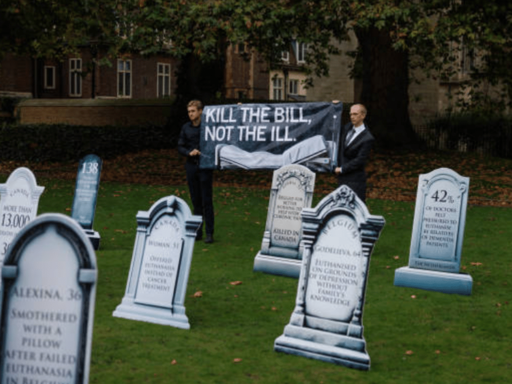It’ll come as a surprise to nobody that, once again, parliament is being dodgy about the Assisted Dying Bill. The, to give it its full name, Terminally Ill Adults (End of Life) Bill has been marred with controversy at every step. The shambles range the bill barely even being written before it was voted on in the Commons to it being rushed through at every step.
Despite there being so many Peers wishing to speak in the Lords debate that they had to space it out over two days, and around two-thirds of peers who spoke against the bill, it still progressed through to the committee stage.
Assisted Dying campaigners persist
Whilst many parts of the establishment are for Assisted Dying, disabled campaigners have not stopped raising concerns about the bill. Drawing on what has happened when Assisted Dying has been legalised in other countries, groups such as Not Dead Yet UK have raised awareness of how Assisted Dying could easily be pushed on sick and disabled people who, under a government which doesn’t assist them to live, could be coerced into taking their lives.
That’s why campaigners last week voiced their concerns after the Lords AD committee was announced, and not a single disabled peer was part of it. Speaking to Disability News Service, Not Dead Yet UK’s convener Phil Friend said:
Without lived experience, the committee risks overlooking the realities of subtle coercion and the daily pressures caused by inadequate care and support.
Disabled people must be included in shaping any discussion of a law that could so profoundly affect our lives.
However, crossbench peer Baroness Tanni Grey-Thompson, an active campaigner against Assisted Dying, said she wasn’t concerned and, in turn, hadn’t nominated herself so she could focus on amendments.
Missing analysis
But of course, that wasn’t going to be the end of the bullshit with the Assisted Dying Committee. It’s since been uncovered that they will also be restricting the evidence they take into consideration. Former Downing Street advisor Nikki Da Costa, who has tweeted extensive analysis of the Bill, posted something many had missed from the committee announcement – that they would not be accepting written evidence from anyone other than the speakers they invited.
The committee’s description says:
Owing to the short timeframe for the inquiry and the limited scope of the Committee as established in the motion to appoint it, the Committee is not seeking or accepting written evidence other than from invited witnesses.
To point out the obvious, by not allowing written evidence, except from the few selected speakers they’ve allowed, the committee is controlling the evidence it receives. This means the committee is less likely to hear from disability rights or domestic abuse campaigners who will raise vital concerns about how vulnerable people will be coerced into Assisted Dying either by loved ones, doctors or the state.
Da Costa asked:
Anyone aware of any precedent for this? To actively say “we don’t want to know”?
This revelation was met with uproar, especially from many MPs who had voted against the bill.
Naz Shah, who was on the original House of Commons committee, said:
This bill has changed so radically since the committee, of which I was a member of which considered it, the idea that the House of Lords shouldn’t accept new written evidence is utterly ludricous.
On the House of Commons committee, 444 pieces of written evidence were accepted.
Tim Farron, former leader of the Liberal Democrats, said:
This looks like a transparent attempt to limit scrutiny and debate – I hope they will reconsider and listen to all voices.
Meanwhile, Jess Asato called shenanigans, which seems most accurate:
It seems very odd to have a Committee which isn’t able to accept written evidence. The Bill has changed since it was first proposed and how can a Committee on a Bill of this magnitude come to a reasoned conclusion on just a few sessions of oral evidence? Feels like shenanigans
By all accounts, this seems like just another in a long line of ways that the government is intent on pushing this bill through and trying to limit opposition in any way they can.
The first of the evidence sessions is tomorrow, when sponsors of the bill, Kim Leadbeater and Lord Falconer will face questioning from the committee. Let’s see how they attempt to weasel out of this one.
Featured image via the Canary
From Canary via this RSS feed


